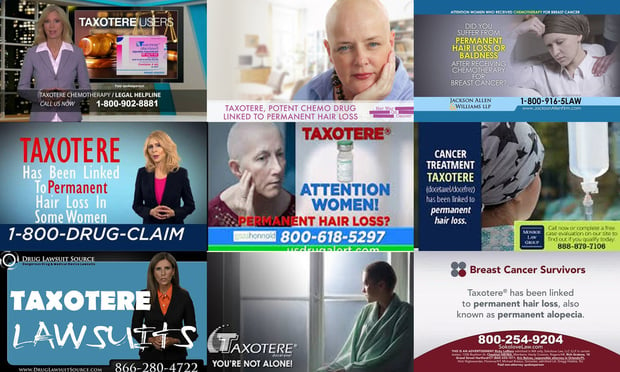Plaintiffs Lawyers Want Talk of 'Lawsuit Abuse' Out of the 1st Taxotere Trial
Plaintiffs lawyers suing over the breast cancer drug Taxotere filed motions this week to ensure that the first bellwether trial against Sanofi-Aventis U.S. LLC is not about them.
July 18, 2019 at 07:16 PM
4 minute read
 Taxotere screenshots from television ads.
Taxotere screenshots from television ads.
Plaintiffs lawyers suing over the breast cancer drug Taxotere filed motions this week to ensure that the first bellwether trial against Sanofi-Aventis U.S. LLC is not about them.
“Plaintiff anticipates that Sanofi may attempt to alienate the jury by converting the trial into a referendum on lawful practices by plaintiff attorneys,” wrote lead trial counsel Darin Schanker, of Denver's Bachus & Schanker, and Rand Nolen, of Fleming, Nolen & Jez in Houston, in a motion filed ahead of a trial scheduled for Sept. 16.
In a separate motion, they also sought to limit “certain irrelevant and unfairly prejudicial matters” about alleged “lawsuit abuse” or “lawyer-driven science,” among other things.
“Defendant may attempt to present argument or evidence suggesting that this lawsuit or litigation as a whole and the science involved is lawyer-driven, fabricated, or exaggerated by counsel who make money through product liability lawsuits,” they wrote.
The motions are the latest in the Taxotere litigation to address controversial issues flagged by tort reformers, such as the influence of lawyer advertising and outside litigation financing on plaintiffs in mass tort cases. In 2017, plaintiffs attorneys threatened sanctions against Sanofi for filing a motion filled with “unfounded accusations” that are “indecent and vexatious” in an attempt to get information on outside funding in the litigation, which now numbers nearly 12,000 lawsuits in federal court in New Orleans, plus hundreds of cases in New Jersey state courts.
Sanofi-Aventis, in a renewed motion filed months later, raised concerns about fee arrangements with doctors, medical screenings of plaintiffs and outside funders that allowed doctors to charge inflated costs on medical liens. Defendants have made similar requests for outside financing disclosures in cases involving blood thinner Xarelto and Johnson & Johnson's baby powder.
The lawsuits claim Taxotere caused women to suffer permanent hair loss, or alopecia areata—a side effect the U.S. Food and Drug Administration acknowledged in a labeling change in 2015.
In one motion filed this week, plaintiffs lawyers asked to prohibit references to lawyer advertising in the upcoming trial. In another, they wanted a bar on statements about the number of attorneys suing over Taxotere and their financial status, as well as their “means of travel.”
“Permitting counsel and witnesses to interject these improper statements or comment on these matters, thus requiring plaintiff's counsel to repeatedly object in the presence of the jury, would only serve to draw attention to them and exacerbate the unfair prejudicial impact on plaintiff,” they wrote. “Further, any such testimony would be highly and unfairly prejudicial, and is calculated to do nothing more than inflame jurors and play on their biases about lawyers or the alleged need for tort reform.”
They also sought to limit discussion about payments to their experts and prohibit mention of settlement discussions and plaintiff's bar training programs, noting, “In today's world, public suspicion and even disapproval of the professional conduct of plaintiffs' attorneys is not uncommon.”
Sanofi brought its own motion to prohibit plaintiffs attorneys from bringing up advocacy groups or individuals referred to as “Taxotears.”
Neither Schanker nor Nolen, nor co-lead counsel Christopher Coffin, a partner at Pendley Baudin & Coffin in New Orleans, and Karen Barth Menzies, a Los Angeles partner at Girard Gibbs, responded to a request for comment.
Sanofi lawyers Jon Strongman, of Shook, Hardy & Bacon in Kansas City, Missouri, and Douglas Moore, of New Orleans-based Irwin Fritchie Urquhart & Moore, also did not respond.
In March, U.S. District Judge Jane Milazzo of the Eastern District of Louisiana pushed back the original May 13 trial date for the first bellwether trial to September. She has set additional trials for 2020.
This content has been archived. It is available through our partners, LexisNexis® and Bloomberg Law.
To view this content, please continue to their sites.
Not a Lexis Subscriber?
Subscribe Now
Not a Bloomberg Law Subscriber?
Subscribe Now
NOT FOR REPRINT
© 2025 ALM Global, LLC, All Rights Reserved. Request academic re-use from www.copyright.com. All other uses, submit a request to [email protected]. For more information visit Asset & Logo Licensing.
You Might Like
View All
Hogan Lovells, Jenner & Block Challenge Trump EOs Impacting Gender-Affirming Care
3 minute read
DC Lawsuits Seek to Prevent Mass Firings and Public Naming of FBI Agents
3 minute read
Divided State Supreme Court Clears the Way for Child Sexual Abuse Cases Against Church, Schools

'Serious Legal Errors'?: Rival League May Appeal Following Dismissal of Soccer Antitrust Case
6 minute readTrending Stories
- 1States Accuse Trump of Thwarting Court's Funding Restoration Order
- 2Microsoft Becomes Latest Tech Company to Face Claims of Stealing Marketing Commissions From Influencers
- 3Coral Gables Attorney Busted for Stalking Lawyer
- 4Trump's DOJ Delays Releasing Jan. 6 FBI Agents List Under Consent Order
- 5Securities Report Says That 2024 Settlements Passed a Total of $5.2B
Who Got The Work
J. Brugh Lower of Gibbons has entered an appearance for industrial equipment supplier Devco Corporation in a pending trademark infringement lawsuit. The suit, accusing the defendant of selling knock-off Graco products, was filed Dec. 18 in New Jersey District Court by Rivkin Radler on behalf of Graco Inc. and Graco Minnesota. The case, assigned to U.S. District Judge Zahid N. Quraishi, is 3:24-cv-11294, Graco Inc. et al v. Devco Corporation.
Who Got The Work
Rebecca Maller-Stein and Kent A. Yalowitz of Arnold & Porter Kaye Scholer have entered their appearances for Hanaco Venture Capital and its executives, Lior Prosor and David Frankel, in a pending securities lawsuit. The action, filed on Dec. 24 in New York Southern District Court by Zell, Aron & Co. on behalf of Goldeneye Advisors, accuses the defendants of negligently and fraudulently managing the plaintiff's $1 million investment. The case, assigned to U.S. District Judge Vernon S. Broderick, is 1:24-cv-09918, Goldeneye Advisors, LLC v. Hanaco Venture Capital, Ltd. et al.
Who Got The Work
Attorneys from A&O Shearman has stepped in as defense counsel for Toronto-Dominion Bank and other defendants in a pending securities class action. The suit, filed Dec. 11 in New York Southern District Court by Bleichmar Fonti & Auld, accuses the defendants of concealing the bank's 'pervasive' deficiencies in regards to its compliance with the Bank Secrecy Act and the quality of its anti-money laundering controls. The case, assigned to U.S. District Judge Arun Subramanian, is 1:24-cv-09445, Gonzalez v. The Toronto-Dominion Bank et al.
Who Got The Work
Crown Castle International, a Pennsylvania company providing shared communications infrastructure, has turned to Luke D. Wolf of Gordon Rees Scully Mansukhani to fend off a pending breach-of-contract lawsuit. The court action, filed Nov. 25 in Michigan Eastern District Court by Hooper Hathaway PC on behalf of The Town Residences LLC, accuses Crown Castle of failing to transfer approximately $30,000 in utility payments from T-Mobile in breach of a roof-top lease and assignment agreement. The case, assigned to U.S. District Judge Susan K. Declercq, is 2:24-cv-13131, The Town Residences LLC v. T-Mobile US, Inc. et al.
Who Got The Work
Wilfred P. Coronato and Daniel M. Schwartz of McCarter & English have stepped in as defense counsel to Electrolux Home Products Inc. in a pending product liability lawsuit. The court action, filed Nov. 26 in New York Eastern District Court by Poulos Lopiccolo PC and Nagel Rice LLP on behalf of David Stern, alleges that the defendant's refrigerators’ drawers and shelving repeatedly break and fall apart within months after purchase. The case, assigned to U.S. District Judge Joan M. Azrack, is 2:24-cv-08204, Stern v. Electrolux Home Products, Inc.
Featured Firms
Law Offices of Gary Martin Hays & Associates, P.C.
(470) 294-1674
Law Offices of Mark E. Salomone
(857) 444-6468
Smith & Hassler
(713) 739-1250








